PrAACtical Supports for the Young AAC Learner: Recipes for Success, Part 1
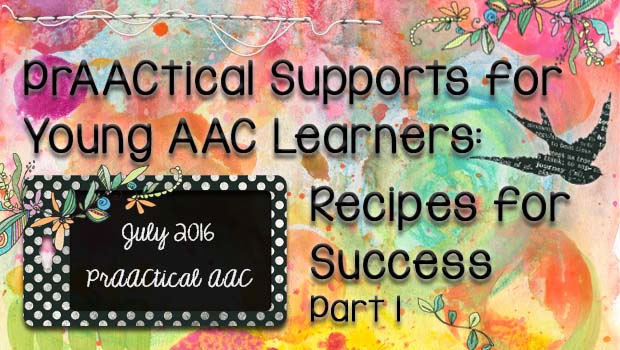
One of the most gratifying things about the AAC field is being able to connect with talented professionals who love what they do and are passionate about supporting learners with little or no 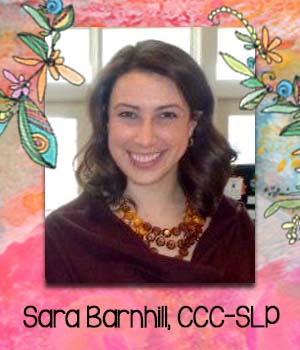 functional speech. I am humbled by the incredibly generous ways in which clinicians are supporting their clients and one another. Today’s post, by SLP Sara Barnhill, is a case in point.
functional speech. I am humbled by the incredibly generous ways in which clinicians are supporting their clients and one another. Today’s post, by SLP Sara Barnhill, is a case in point.
Sara has worked at Children’s Hospital of Richmond at VCU (CHoR) for seven years. She is a member of the Assistive Technology (AT) Core team and completes multiple AAC evaluations per week as well as AAC therapy. Her caseload includes patients in clinics, out-patient therapy, and on the Transitional Care Unit which provides pediatric long-term care. Through her specialty areas, Sara has discovered a love for sharing information and training others. Sara has presented in multiple conferences at the local, state, and national levels. Sara has also completed University of Illinois at Chicago’s AT Certificate Program.
CHoR’s AT Program is one of few comprehensive AT programs in Central Virginia. The program provides AT evaluations, equipment and training to people of all ages, enabling children and adults with disabilities to function more independently. CHoR’s AT team consists of four SLPs, two OTs, one PT, and one Therapy Practice Assistant. In addition to completing transdiciplinary evaluations and treatments, CHoR’s AT team is responsible for supporting staff and sharing AT information to five CHoR therapy centers throughout Central Virginia.
In this post, Sara shares two resources developed at the CHoR AT Program that help stakeholders learn to build core vocabulary skills through play. Don’t miss the link to download the parent handouts that were created by this dynamic team. You’ll love the engaging and prAACtical suggestions that Sara and her colleagues provide.
:::::::::::::::::::::::::::::::::::::::::::::::::::::::::::::::::::::::::::::
Let’s Play with Core! Recipes for Success
Abandonment of AAC systems is a recognized problem in the field of AT. Therapists, teachers, and caregivers alike often feel uncomfortable and intimidated by AAC. We can all acknowledge that “it takes a village,” but appropriately supporting “AAC villagers” at a level that facilitates both device use for the AAC user and increases comfort for the caregiver is often easier said than done. Children’s Hospital of Richmond’s AT Core Team has created several programmatic solutions in order to provide specific training and improve device use.
Our team of four SLPs and two OTs is responsible for completing six to eight AAC evaluations per week and then follow-up training for devices upon their receipt. In follow-up appointments, we found ourselves doing a lot of modeling and talking to caregivers who responded largely with glazed expressions. We were inundating families with information without providing any tangible supports for them to take home and apply. Understandably, carryover to home was not the best. We realized that we needed to provide scaffolded support to caregivers in the same way that we did for AAC users.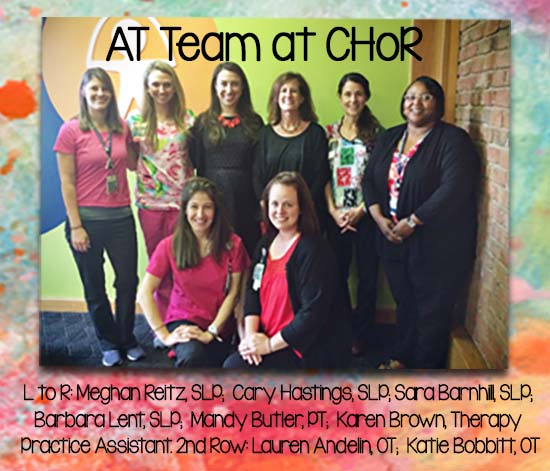
Our team worked to create supports that address a variety of learning styles for both staff and caregivers. We identified features for caregiver training such as: structured stair steps with AAC; easy to model and facilitate generalization; increased ability to report information and answer questions regarding home use of AAC.
The “Recipes for Success” program provides activity specific sheets for common toys/activities with corresponding vocabulary for a variety of language acts. These recipes also provide step-by-step scripts for device implementation into familiar activities and suggestions for generalization of vocabulary and skills after clinicians become more comfortable and confident with AAC use. Our hospital also received a Children’s Miracle Network Mini-Grant for provision of common toys to families with limited means (Potato Head, books, puzzles, etc.) that accompany the Recipes. Providing materials allows caregivers to observe and participate in device use with said toy in therapy in order to feel more comfortable carrying over device use with the same toy in their home environment. While the CMN Mini-Grant has been very helpful in our facility, this program does not require that the materials be provided. The toys and activities we selected are common and many families already have them at home.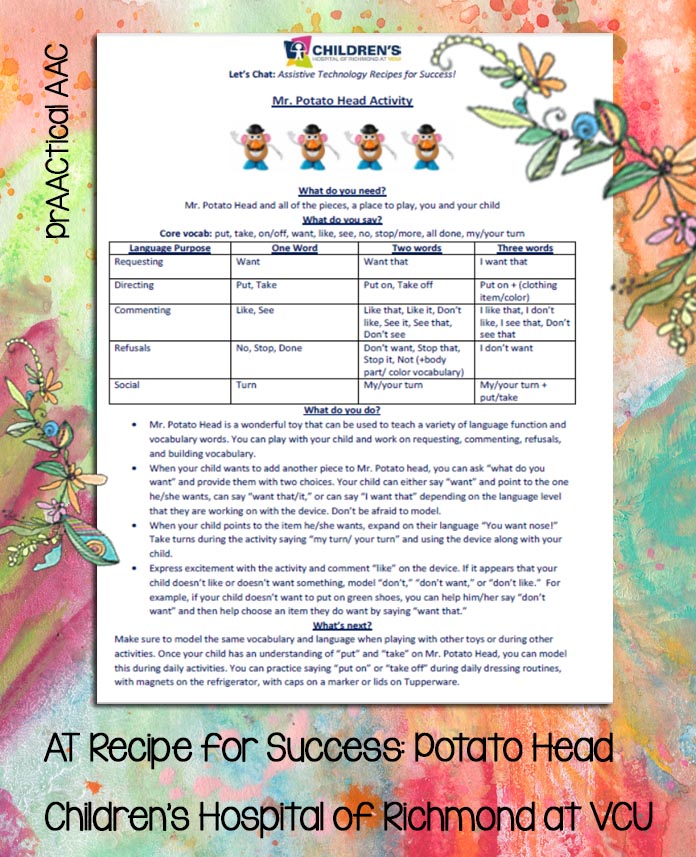
Since our team “epiphany” regarding the changes needed to our methods of staff and caregiver training, our team has radically shifted our approach to education and support in order to give voices to our patients. We have had great feedback from caregivers and staff and are excited to share resources with the PrAACtical AAC community! We’ll be sharing recipes for a variety of fun summer toys, starting with animal puzzles and Potato Head.
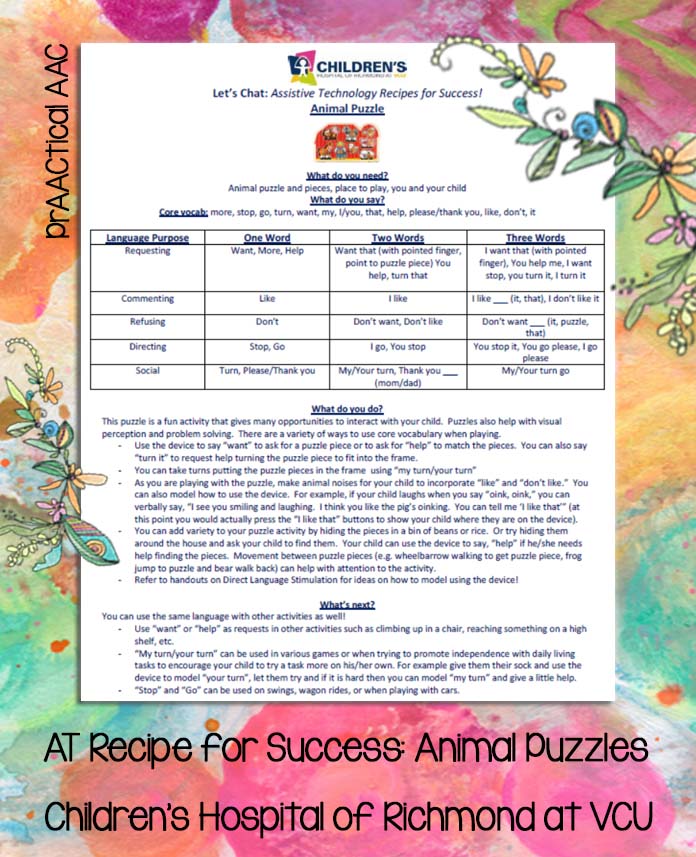 You can download the first two Recipes for Success parent handout here. Stayed tuned for future CHoR posts and recipes for use with communicators, to use in shared book reading or during sensorimotor play, and more. Have fun talking and playing!
You can download the first two Recipes for Success parent handout here. Stayed tuned for future CHoR posts and recipes for use with communicators, to use in shared book reading or during sensorimotor play, and more. Have fun talking and playing!
Filed under: Featured Posts, PrAACtical Thinking
Tagged With: beginning communicators, core vocabulary, parent training, play
This post was written by Carole Zangari

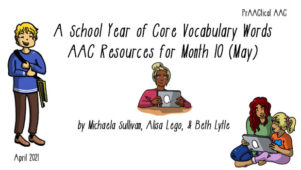
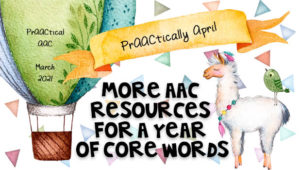
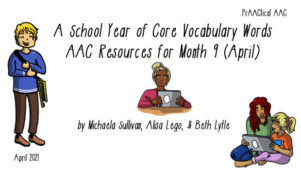
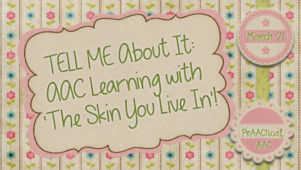
4 Comments
I love giving parents – and school staff – activity language plans like these. I find that once they’ve had a couple of activities planned out for them; giving them ideas of which words to use when, how to move from 1 to 2 to 3 words, that they can “get it” more easily, and then can start to do the planning on their own. Great ideas!
Thank you so much for sharing this. These are terrific for sharing with parents.
They did such a great job with these, didn’t they?! I can see these being a real staple in our clinical/educational tool kits. Thanks for taking the time to comment, Lori! Stay tuned for more from this wonderful team in August.
Is there a website where you can access all of the AT Recipes for Success activities and recipes?